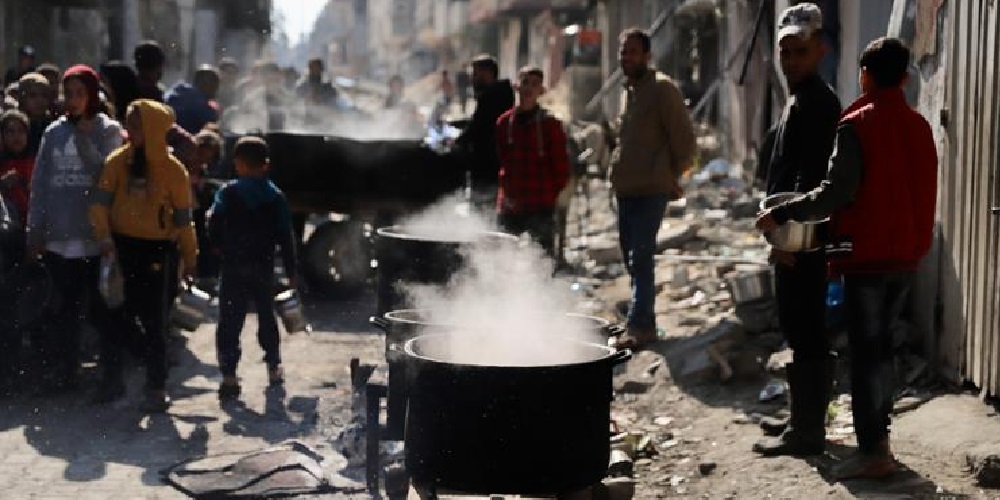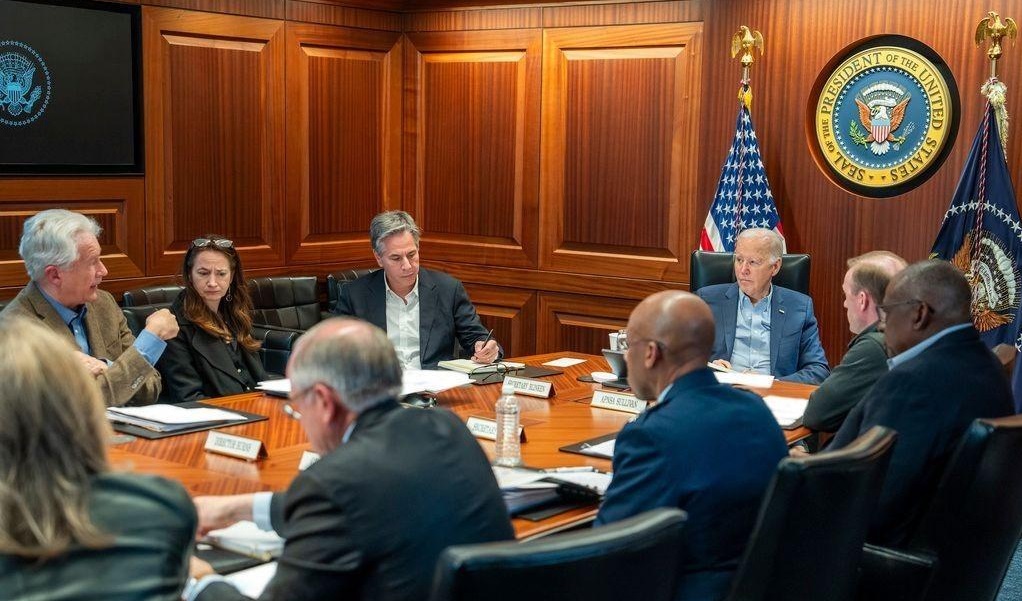Foreign
Israel Forces Fire On Gazans Rushing For Food Aid

Israeli forces in war-torn Gaza opened fire on Palestinians scrambling for food aid in a chaotic melee on Thursday that the health ministry in the Hamas-run territory said killed more than 100 people.
The Israeli military said a “stampede” occurred when thousands of desperate Gazans surrounded a convoy of 38 aid trucks, leading to dozens of deaths and injuries, including some who were run over by the lorries.
An Israeli source acknowledged troops had opened fire on the crowd, believing it “posed a threat”.
The Gaza health ministry condemned what it called a “massacre” in Gaza City in which 112 people were killed and more than 750 others wounded.
The incident adds to a Palestinian death toll from the war which the ministry earlier Thursday said had topped 30,000, and dampens hopes a truce deal between Israel and Hamas militants could be just days away.
There were conflicting reports on what exactly unfolded in the hours before dawn.
A witness in Gaza City, declining to be named for safety reasons, said violence unfolded when thousands of people rushed towards aid trucks at the city’s western Nabulsi roundabout, and soldiers fired at the crowd “as people came too close” to tanks.
Israeli army spokesman Daniel Hagari said the military had fired “a few warning shots” to try to disperse a crowd that had ambushed the aid trucks.
When the crowd got too big, he said the convoy tried to retreat and “the unfortunate incident resulted in dozens of Gazans killed and injured”.
Aerial images released by the Israeli army showed what it said were scores of Gazans surrounding aid trucks in Gaza City.
Ali Awad Ashqir, who said he had gone to get some food for his starving family, told AFP he had been waiting for two hours when trucks began to arrive.
“The moment they arrived, the occupation army fired artillery shells and guns,” he said.
The army spokesman Hagari later denied Israeli forces carried out any shelling or strikes at the time.
‘Another day from hell’
US President Joe Biden said Washington was checking “two competing versions” of the incident, while a State Department spokesman said the United States had been in touch with Israel and was “pressing for answers” on what happened.
The shooting incident would complicate efforts to broker a truce, Biden said, later admitting that any deal was unlikely to happen by Monday — the timeline that he had predicted earlier this week.
The US president spoke with Qatari and Egyptian leaders in separate phone calls, the White House said, saying he discussed both the ceasefire and the “tragic and alarming” aid incident.
The UN Security Council will hold a closed-door emergency meeting on the incident on Thursday afternoon.
Saudi Arabia strongly condemned what it called the “targeting” of unarmed civilians, while Kuwait and the UAE also issued condemnations.
Qatar warned that Israel’s “disregard for Palestinian blood… (will) pave the way for an expanding cycle of violence”.
Italy called for an immediate ceasefire in Gaza to facilitate more humanitarian aid.
Looting of aid trucks has previously occurred in northern Gaza, where desperate residents have taken to eating animal fodder and even leaves to try to stave off starvation, as aid groups warn of looming famine after nearly five months of war.
The chief of the United Nations agency for Palestinian refugees, UNRWA, said that no UN agency had been involved in Thursday’s aid delivery, and called it “another day from hell”.
Truce hopes
The war began on October 7 with an unprecedented Hamas attack on southern Israel that resulted in the deaths of around 1,160 people, mostly civilians, Israeli figures show.
Militants also took about 250 hostages, 130 of whom remain in Gaza, including 31 Israel says are presumed dead.
Israel’s retaliatory military campaign has killed 30,035 people, according to the Hamas-run Gaza’s health ministry.
Israel’s military says 242 soldiers have died in Gaza since ground operations began in late October.
Washington, a key ally of Israel, has been pushing for a reduction in civilian casualties and a ceasefire.
It has been working with mediators from Egypt and Qatar to seek a six-week pause in the war.
Negotiators had hoped a truce could begin by around March 10 or 11 when the Muslim holy month of Ramadan begins, depending on the lunar calendar.
The proposals reportedly include the release of some Israeli hostages held in Gaza by militants in exchange for hundreds of Palestinians held in Israeli prisons.
Short of the complete withdrawal Hamas has called for, a source from the group said the deal might see Israeli forces leave “cities and populated areas”, allowing the return of some displaced Palestinians and humanitarian relief.
Fears of famine
The World Food Programme has said Israel has blocked access for aid deliveries — which Israeli officials have denied — and warned that if nothing changes, “a famine is imminent in northern Gaza”.
As fighting continued in Gaza, Muhammad Yassin, 35, battled to find flour in Zeitun.
“We have not eaten a loaf of bread for two months,” he said. “Our children are starving.”
In the south, nearly 1.5 million people trying to flee the fighting are now packed into Rafah city, also short of food, as Israel threatens to send in troops against Hamas fighters.
Israeli Prime Minister Benjamin Netanyahu has come under increasing pressure to bring the remaining hostages home.
A group of 150 Israelis have started a four-day march from Reim, near the Gaza border, to Jerusalem, calling for the government to reach a deal.
Violence has also surged in the occupied West Bank, where two Israelis were killed on Thursday.
AFP
Foreign
Zambian president sacks top judges who ruled in favour of his rival

Zambia’s President Hakainde Hichilema has now sacked three top judges he previously suspended over alleged judicial misconduct, drawing further accusations of political interference in the judiciary.
The three Constitutional Court judges presided over a presidential petition in 2016 in which they dismissed Hichilema’s challenge against the election victory of former President Edgar Lungu.
They also took part in a controversial ruling allowing Lungu to stand in the 2021 elections, despite having twice served as Zambia’s president.
Their dismissal comes after they lost a court application for a review of a judicial panel’s decision recommending their suspension.
On Sunday evening, a statement released by the presidency said they had been “removed with immediate effect” following a recommendation by the Judicial Complaints Commission (JCC).
“The removal of the judges is in exercise of the powers vested in the President under [the Zambian constitution],” it said.
The three judges – Justice Annie Sitali, Justice Mungeni Mulenga, and Justice Palan Mulonda – have not publicly commented on the matter.
The JCC had investigated them over allegations of gross misconduct following a complaint by Moses Kalonde, a private citizen.
Last year, the JCC rejected a complaint from lawyer Joseph Busenga, who had petitioned for the removal of the three judges, alleging that they had mishandled the 2016 election petition.
There has been mixed reactions to the dismissal of the judges.
Political tensions have been in rising in Zambia ahead of elections in 2026, when Hichilema and Lungu are expected to face each other for a fourth time.
Social and political commentator Laura Miti says informed Zambians are split between those who feel this is a legal but self-serving move by the president and others who back him.
“My view is that the judges misbehaved spectacularly in the presidential petition in 2016. That being true this comes across as the president exacting revenge for their judgment which is highly concerning,” she told the BBC.
But Makebi Zulu, Lungu’s lawyer in the case, termed the move an “illegality” telling the BBC that “it was executive overreach aimed at interfering with the independence of the judiciary”.
“No judge should be disciplined for carrying out their judicial function,” he said.
Under Zambia’s constitution, all judges, including the chief justice, are appointed by the president upon the recommendation of the JCC and with the approval of the National Assembly.
Political analyst Sishuwa Sishuwa says the “reality is that we will always have the problem of incompetent and unqualified judges as long as the process of appointment is led by the executive.
“It does not matter who is in power,” he posted on X, adding that a “structured and broad-minded approach” is more beneficial than “targeted and individual changes”.
Source: bbc.com
Foreign
US investigating release of classified documents on Israel’s planned strike on Iran

The top-secret documents highlight that Israel is mobilizing military assets in preparation for a military response to Iran’s recent ballistic missile attack on October 1.
The United States government is investigating the unauthorized release of classified documents that detail Israel’s military strategies concerning a potential attack on Iran.
According to three U.S. officials who spoke to the Associated Press, a fourth source confirmed the legitimacy of the documents, which were attributed to the National Geospatial-Intelligence Agency (NGA) and the National Security Agency (NSA).
The top-secret documents highlight that Israel is mobilizing military assets in preparation for a military response to Iran’s recent ballistic missile attack on October 1.
Notably, the documents were sharable within the intelligence-sharing alliance known as the “Five Eyes,” which includes the U.S., Great Britain, Canada, New Zealand, and Australia.
First reported by CNN and Axios, the sensitive materials were posted on the Telegram messaging app, prompting immediate concerns over national security.
Officials, who requested anonymity due to the sensitivity of the matter, revealed that the investigation is probing the origins of the leak, including whether it stemmed from an intentional disclosure by someone within the U.S. intelligence community or if it was acquired through alternative means such as hacking.
AP reports that the U.S. has urged Israel to capitalize on the elimination of Hamas leader Yahya Sinwar by pushing for a cease-fire in Gaza.
The U.S. has also strongly cautioned Israel against escalating military operations in northern Lebanon, warning of the potential for a wider regional conflict.
Despite this, Israeli leadership has reiterated its stance of responding decisively to missile attacks from Iran.
In a statement, the Pentagon acknowledged awareness of the leaked documents but declined to provide further comment.
The Israeli military has not yet responded to inquiries regarding the leak of two documents, which first surfaced online Friday via a Telegram channel claiming the leak originated from within the U.S. intelligence community.
The information appears to have been compiled through satellite image analysis.
One of the leaked documents was formatted similarly to materials from the National Geospatial-Intelligence Agency, previously leaked by Jack Teixeira, an Air National Guardsman who pleaded guilty in March to charges related to disclosing highly classified military documents concerning Russia’s war in Ukraine and other national security matters.
The Telegram channel responsible for the leak identifies itself as based in Tehran, Iran’s capital, and has previously shared content featuring Iran’s Supreme Leader Ayatollah Ali Khamenei, as well as material supporting Tehran’s so-called “Axis of Resistance,” which includes militant groups in the Middle East armed by the Islamic Republic.
Foreign
SAD! Seven fatalities recorded as crowded ferry dock collapses in Georgia

NO fewer than seven people have died after part of a ferry dock collapsed in Georgia’s Sapelo Island on Saturday, October 20, 2024.
Georgia’s department of natural resources, which operates the dock, said at least 20 people plunged into the water when the gangway collapsed.
The incident happened at approximately 16:30 local time (20:30 GMT) at the Marsh Landing Dock as crowds gathered for a cultural celebration.
Multiple people have been taken to hospital and search and rescue operations are under way.
US President Joe Biden said he and his wife Jill mourn the lives lost and “pray for the injured and anyone still missing”.
It is not yet known what caused the collapse of the walkway, which connected an outer dock where people board the ferry to another dock onshore, according to local reports.
Brian Kemp, the governor of Georgia, said he and his family were “heartbroken” by the tragedy and asked for prayers “for those lost, for those still in harm’s way, and for their families”.
The governor has sent “state resources to aid in search, rescue, & recovery”, Georgia representative Buddy Carter said in a post on X.
Biden said his team “stand ready to provide any and all assistance that would be helpful to the community”.
Local authorities said the gangway has been secured and the incident is under investigation.
Tyler Jones, a spokesperson for Georgia’s National Resources Department, said there was “no collision,” according to the Associated Press agency.
The thing just collapsed,” he said. “We don’t know why.”
Pastor Jerald Thomas of the nearby Elm Grove Church went to the scene to help.
“They came together quickly, and they began to send the necessary things that was needed in order to make the people stay while they were going through this tragic time,” he told local outlet WTOC.
People had gathered Saturday to celebrate the island’s community of Hogg Hummock, which is home to a few dozen black residents.
Hogg Hummock was founded by newly-freed former enslaved people from plantations in coastal Georgia who settled on Sapelo Island following the US Civil War, the Georgia Trust for Historic Preservation said on its website.
Saturday’s event “should have been a joyous celebration of Gullah-Geechee culture and history instead turned into tragedy and devastation”, President Biden said in his statement.
-

 News22 hours ago
News22 hours agoReps Pass For Second Reading Bill To Create New Oyo State
-

 News22 hours ago
News22 hours agoReps Examine Bill Seeking Military Involvement In Farming, Ranching
-

 News17 hours ago
News17 hours agoJust in; FG to remove VAT on essential commodities
-

 News8 hours ago
News8 hours agoDeath Toll Hits 181, another 80 in Critical Condition in Hospital
-

 News23 hours ago
News23 hours agoReps Want 50% Agricultural Lending For Small Holder Farmers
-

 Economy16 hours ago
Economy16 hours agoIMF Revises Nigeria’s 2024 Economic Growth Forecast Downward to 2.9%
-

 Metro16 hours ago
Metro16 hours agoSAD! Five senior Air Force officers die in road accident
-

 News22 hours ago
News22 hours agoConstitution Review: Reps to Engage NGF, NGE, LG Chairmen, CSOs, Others






